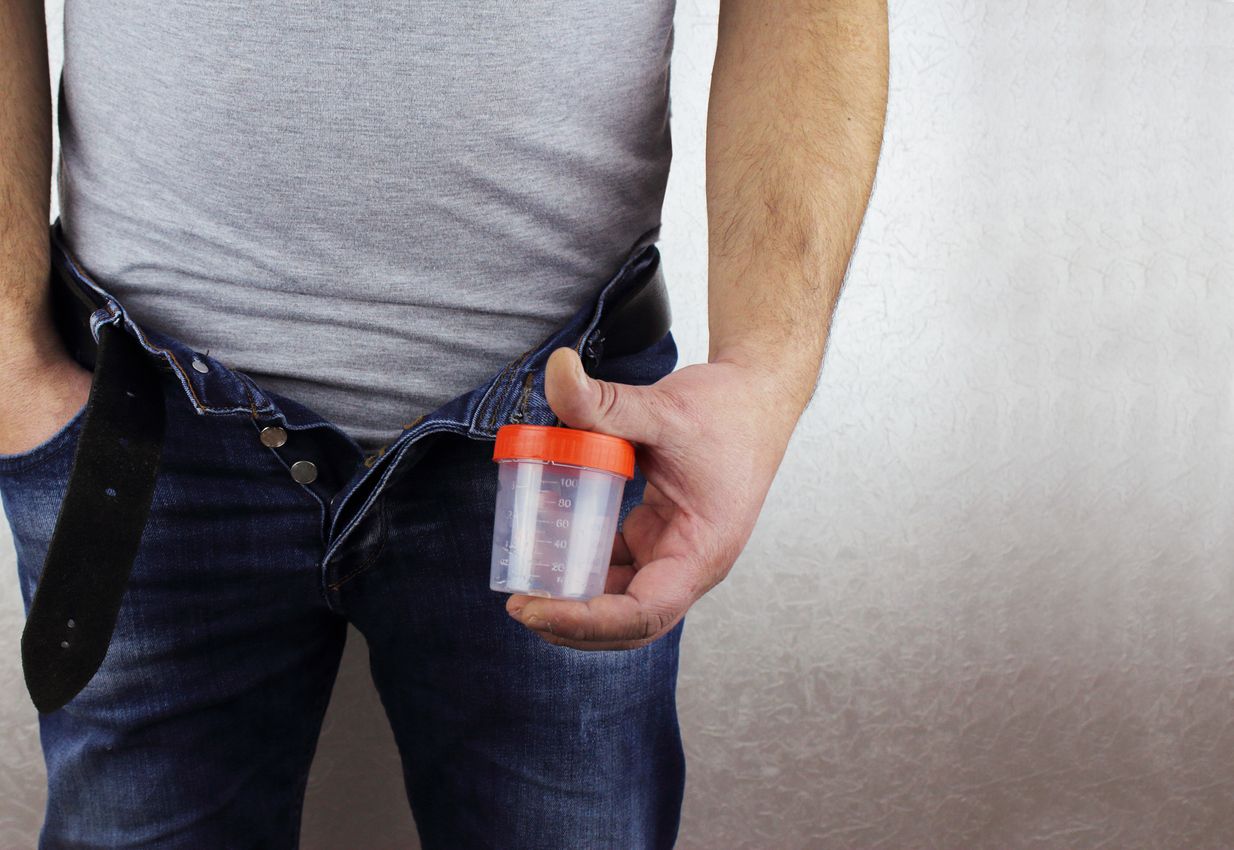Every bloke needs an MOT now and then
In aid of Men's Health Week (June 13-19), we thought it would be a good idea to put together a series of simple health checks men can do quickly and easily - many of which you can do yourself at home and others that should help bring you that little extra peace of mind.
1. Get a blood pressure check
It's one of the first things checked at pretty much any doctor appointment and that's because it's one of the quickest and most important tests a medical professional can carry out. High blood pressure can be caused by all sorts of things and can lead to unnecessary strain on your heart, other organs and the vessels running around your body - so best get your arm squeezed, lad.
You can even order
blood pressure kits to your home for those wary of heading into the GPs or struggling to get an appointment right away. Of course, if you are unsure or don't feel confident using one, it's always best to go to a professional. One in three Brits have hypertension - so make sure it's something you're keeping track of.
https://www.youtube.com/watch?v=TItRBH7wbfk&t=138s
2. Measure your cholesterol
The two go hand-in-hand: one of the biggest causes of high blood pressure is a high cholesterol diet, ie lots of fat, salt and sugar. While we admit these might be considered the good bits, everyone knows too much of a good thing often turns bad, whereas everything in moderation means you can continue to enjoy what you love.
As for checking your cholesterol specifically, it's as simple as getting a blood test while you're in the doctor's surgery. In fact, if you're getting a once over from your GP, chances are they'll be taking a blood sample shortly after squeezing your arm - and if they aren't, ask for one.
3. Diabetes test
You can't talk about blood pressure and cholesterol without delving into diabetes. It has been estimated that one in 40 people in the UK now suffer from type two diabetes (the most common form) and around 400,000 have type one, which is often genetic - so it's important we all do our best to manage the statistics.
There are many signs that could possibly indicate a diagnosis - frequent weeing, extreme hunger, weight loss, blurry vision, fatigue and feeling light-headed - but there's only one way to know for sure: get tested by your GP through a
private consultation at your local pharmacy or, once again, by using a test kit at home.
4. Feel your balls
[caption id="attachment_342805" align="alignnone" width="1254"]

Credit: iStock[/caption]
It's the one you're told about from puberty onwards and for good reason: about half of all
testicular cancer cases occur in men between 20 and 34, with 30-34 being the most high-risk period. However checking for lumps 'n bumps is really simple.
Firstly, hold one testicle between your thumb and fingers of both hands and roll it gently between them. Secondly, look and feel for any hard lumps, smooth or rounded bumps, or any change in the size, shape, colour or consistency of the testicles. Thirdly, repeat on the other ball. Once again, you can always go to a doctor if you want to be fully certain.
5. ...and your man boobs
Now before you go and get all defensive, we just mean your pectoral area. It might sound rare and but
more than 350 men are diagnosed with breast cancer every year and getting ahead of the problem/ruling it out is as simple as having a feel - just like a woman would when doing their recommended routine check once every month or so.
To check your pecs, press your fingers flat against the skin and move firmly in small, clockwise circles, starting at the outermost top edge of your chest and spiralling towards the nipple, whilst feeling for hard lumps or small bumps. Be certain to cover the entire surface.
Then proceed to squeeze both nipples and look for any discharge as well as any bruising, puckering, dimpling or any changes in the size, shape and contour of each breast. You may feel smaller, softer bumps that you've never noticed before but anything that feels out of the ordinary and it's time to get to the doctors - even if only to confirm they're harmless.
6. Have a GP check your prostrate
If you're experiencing any of the following: difficulty starting or stopping urinating, a weak flow of urine, straining, dribbling, multiple wees at night or more frequent urination altogether - it's time for a check-up.
Prostate cancer affects those 45 and older for the most part, with 65-69 considered the high-risk bracket but everyone needs to get a prostate exam at least once every two years, if not annually. It's a quick and painless test that many avoid due to embarrassment but it can be quick way to spot potential problems.
And no, this isn't one we'd recommend doing at home no matter how dextrous you think you are, lads. There's nothing taboo about making sure everything is as it should be down there so just take yourself to the docs and think of England. That being said, PSA testing (yes, the finger) isn't always necessary and
MRI scans are also available.
7. Do a stool sample
[caption id="attachment_342808" align="alignnone" width="1234"]

Credit: iStock[/caption]
Might sound like one of the most unpleasant ones on this list but stool samples can be incredible indicators not only of underlying conditions but what your health looks like overall.
Collecting a sample is as easy as it sounds and should be handed in straight away.
Not only are the tests crucial in diagnosing conditions such as bowel cancer early, which
kills around 16,800 in the UK every year but they can even detect parasitic infections, good and bad bacteria, strains of E. Coli or even if you simply need more fruit and fibre in your diet.
8. Watch that waistline
We're always going to be body positive here but it goes without saying that excess fat can lead to health problems further down the line. Approximately
27.8 per cent of the UK are considered obese and it's a growing problem across the globe that we can easily combat with more exercise and a balanced diet.
We're not expecting all of you to have shredded abs but those who carry more weight around their midriff are more likely to suffer from heart disease, diabetes, certain cancers and many other conditions. It's the toxic
'visceral fat which gathers and wraps your vital organs that can cause serious damage, which is exacerbated by excessive eating, drinking and smoking.
You can calculate your BMI (body mass index) at home easily with the
NHS healthy weight calculator. For most adults, the healthy range is between 18.5 and 24.9 but of course there's more to your overall health than your relative height and weight, so don't simply define yourself by the score. Here's to getting trim this summer.
9. Get an eye test
This one is about as self-explanatory as it gets: you should be getting regular eye check-ups whether you're a man or not but conditions like glaucoma and cataracts are more common in men so it's worth keeping an eye on — entirely intentional pun.
Glaucoma causes increased pressure in the eye whereas cataracts leave cloudy deposits in your eye - but both can lead to blurry vision or even blindness. If you already have a strong prescription, migraines or have diabetes, then you’re at higher risk so it's as simple as getting the peepers checked. Don't be the person Specsavers have been talking about all these years.
10. Observe your mood and talk to someone
[caption id="attachment_342807" align="alignnone" width="2048"]

Credit: Stock[/caption]
Last but not least, it's the one that always seems to be forgotten about - especially amongst blokes - but we can't overstate the importance of taking care of your mental health. We're all modern men here and it goes without saying that no one should suffer in silence.
The whole 'man-up' rhetoric is thankfully long gone and if you're struggling and experiencing feelings of stress, depression, anxiety or anything that is having a negative impact on your mental health, then talk to someone right away. Suicide remains the biggest killer in men under 50 and we simply can't let this go on: look after yourselves and look after your boys. We love you all.
You can contact the
Samaritans any time of day online or over the phone on
116 123, and if you're concerned you or someone else you know might be at risk then
call 999 immediately.
Related links:



 Credit: iStock[/caption]
It's the one you're told about from puberty onwards and for good reason: about half of all testicular cancer cases occur in men between 20 and 34, with 30-34 being the most high-risk period. However checking for lumps 'n bumps is really simple.
Firstly, hold one testicle between your thumb and fingers of both hands and roll it gently between them. Secondly, look and feel for any hard lumps, smooth or rounded bumps, or any change in the size, shape, colour or consistency of the testicles. Thirdly, repeat on the other ball. Once again, you can always go to a doctor if you want to be fully certain.
Credit: iStock[/caption]
It's the one you're told about from puberty onwards and for good reason: about half of all testicular cancer cases occur in men between 20 and 34, with 30-34 being the most high-risk period. However checking for lumps 'n bumps is really simple.
Firstly, hold one testicle between your thumb and fingers of both hands and roll it gently between them. Secondly, look and feel for any hard lumps, smooth or rounded bumps, or any change in the size, shape, colour or consistency of the testicles. Thirdly, repeat on the other ball. Once again, you can always go to a doctor if you want to be fully certain.
 Credit: iStock[/caption]
Might sound like one of the most unpleasant ones on this list but stool samples can be incredible indicators not only of underlying conditions but what your health looks like overall. Collecting a sample is as easy as it sounds and should be handed in straight away.
Not only are the tests crucial in diagnosing conditions such as bowel cancer early, which kills around 16,800 in the UK every year but they can even detect parasitic infections, good and bad bacteria, strains of E. Coli or even if you simply need more fruit and fibre in your diet.
Credit: iStock[/caption]
Might sound like one of the most unpleasant ones on this list but stool samples can be incredible indicators not only of underlying conditions but what your health looks like overall. Collecting a sample is as easy as it sounds and should be handed in straight away.
Not only are the tests crucial in diagnosing conditions such as bowel cancer early, which kills around 16,800 in the UK every year but they can even detect parasitic infections, good and bad bacteria, strains of E. Coli or even if you simply need more fruit and fibre in your diet.
 Credit: Stock[/caption]
Last but not least, it's the one that always seems to be forgotten about - especially amongst blokes - but we can't overstate the importance of taking care of your mental health. We're all modern men here and it goes without saying that no one should suffer in silence.
The whole 'man-up' rhetoric is thankfully long gone and if you're struggling and experiencing feelings of stress, depression, anxiety or anything that is having a negative impact on your mental health, then talk to someone right away. Suicide remains the biggest killer in men under 50 and we simply can't let this go on: look after yourselves and look after your boys. We love you all.
You can contact the Samaritans any time of day online or over the phone on 116 123, and if you're concerned you or someone else you know might be at risk then call 999 immediately.
Credit: Stock[/caption]
Last but not least, it's the one that always seems to be forgotten about - especially amongst blokes - but we can't overstate the importance of taking care of your mental health. We're all modern men here and it goes without saying that no one should suffer in silence.
The whole 'man-up' rhetoric is thankfully long gone and if you're struggling and experiencing feelings of stress, depression, anxiety or anything that is having a negative impact on your mental health, then talk to someone right away. Suicide remains the biggest killer in men under 50 and we simply can't let this go on: look after yourselves and look after your boys. We love you all.
You can contact the Samaritans any time of day online or over the phone on 116 123, and if you're concerned you or someone else you know might be at risk then call 999 immediately.